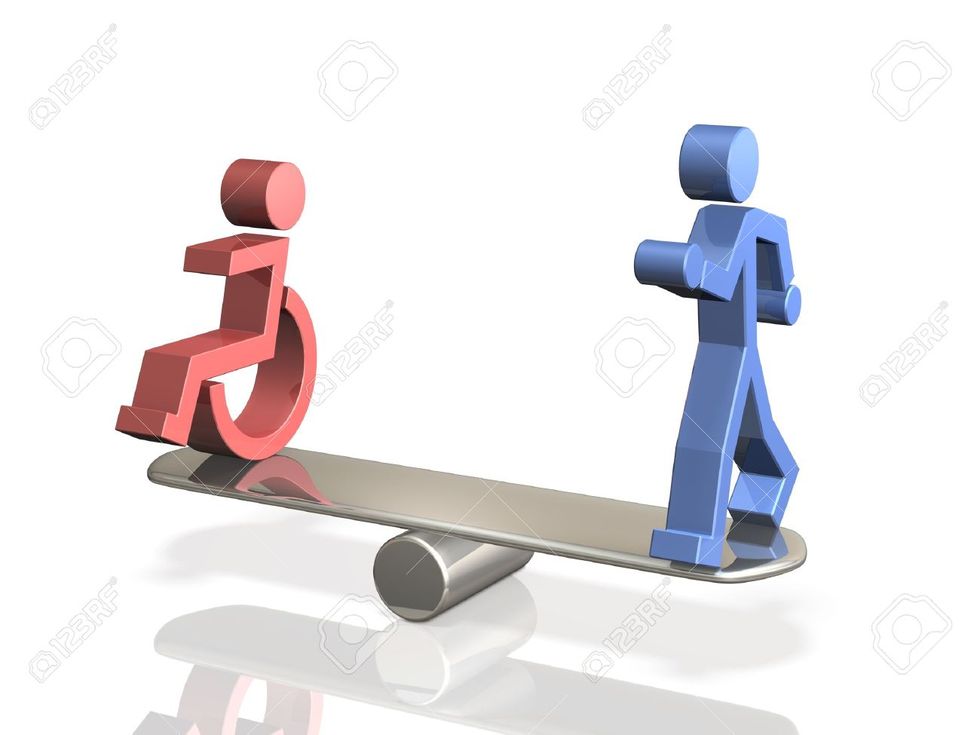I have found in a lifetime of being a person with a disability that able-bodied people are more often than not horribly unaware of their privilege. Some people live in an alternate universe where disabled people don't exist. When they find themselves in a different universe where they do exist, it's hard! The culprit behind this tedious phenomenon is the lack of disability representation in culture. I've found that the only able-bodied people who can even come close to understanding what able-bodied privilege looks like likely have a sibling, child, or parent who is disabled (senile grandparents who you don't live with don't count!)
This list of privileges applies to my experience as a wheelchair user with chronic pain and fatigue. I'm very close to wheelchair users with other medical conditions, and these likely apply to them as well. Please realize that no disabled experience is universal: some of these don't apply to every wheelchair user or person with chronic pain or fatigue, not even me. This list is designed for average, able bodied people. I guarantee that no matter your understanding of disability, you might not be aware of some of these. I hope this is educational for you!
- Being able to walk long distances without assistance and without feeling immense, debilitating pain after
- Not having to worry when an elevator, entryway, or sidewalk is out of service
- Being able to sit on the floor, without back support, or any mildly uncomfortable seat without having to suffer painful consequences
- Being able to stand up for long periods of time
- Being able to run, play sports or physical games without running any sort of serious risks
- Being able to make spontaneous plans and not having to worry about accessibility, fatigue, or pain
- Being able to sit and stand repeatedly
- Not having to worry about your space in crowds
- Not falling and getting hurt or worrying about damaging your mobility equipment if someone bumps into you
- Not having to plan your life around your physical limitations
- Being able to just go to your friend’s house or out on the town without worrying about how you’ll get in anywhere
- Not having to worry about accessibility or fatigue at parties or gathering
- Being able to go to these types of things and fully participate without pain or fatigue
- Being able to use the bathroom by yourself
- Being able to bathe yourself
- Being able to dress yourself
- Being able to get up and go to work or school despite pain
- Being able to cook for yourself
- Being able to feed yourself
- Being able to breathe by yourself
- Not having to put up with people half-assing accommodating you
- Not needing assistance for everything you do
- Not needing to be accommodated at all
- Having no physical limitations (in the long term)
- Not being stared at by random people
- Not being asked random, inappropriate, or invasive questions by random people
- Not having to explain your existence and differences to people
- Not having to be on your guard for inconsiderate people
- Not having to be patronized or infantilized by people who don’t understand
- Not having to constantly watch where you’re going and be aware of inconsiderate and unaware people, lest you hurt them with your mobility equipment or yourself
- Not having to put up with people yelling at you when you accidentally run over them with your mobility equipment if they aren’t watching where they go
- Not having to worry about how you’ll make it through your day if your mobility equipment fails or if your pain and fatigue flares
- Not having to use mobility equipment at all!
- Not having to spend excessive time demanding to be accommodated at work or school
- Not having to demand being accommodated at all!
- Not having to spend more time in physical therapy or resting than with your friends, homework/work, etc.
- Being able to work full time and independently
- Not having to wait forever for assistance
- Not having to wait for accessible bathrooms or dressing rooms in public to open up
- Not having to put up with disgusting conditions in these often neglected places
- Being able to manage in tight spaces
- Being able to get up when you fall
- Being able to reach and lift things for yourself when you’re shopping, or even in your own home
- Not having people claim that they forgot you were disabled if you can walk sometimes (like me)
- Being able to drive yourself place to place
- Being able to afford things you medically need (because disabled people have more medical needs than able-bodied people, and many peoples’ insurance is unreliable)
- Not constantly switching between different medicines
- Not needing medicine at all
- Not having doctors question your disability
- Not having regular people question your disability
- Not having to put up with people saying “God will heal you” or “I’ll pray for you”
- Not having to convince people that your condition is untreatable and God and prayer won’t heal you
- Not having to deal with people asking “have you tried yoga?” (or other ridiculous things that make able-bodied people feel better)
- Not having to put up with slurs like “cripple”
- Not having to put up with people using dumb euphemisms like “handicapable” or “differently abled”
- Not having to deal with people making ridiculous assumptions about what you can and can’t do
- Not having to live as a disabled person in an able bodied world.
















